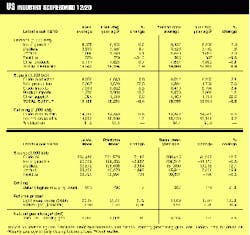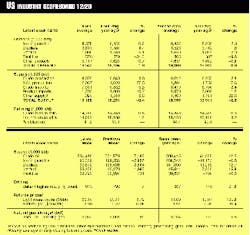OGJ Newsletter
Oil market fundamentals are continuing to improve-to the point of overheating, according to London's Centre for Global Energy Studies.
"The price of oil is on fire," said CGES in its latest monthly market report. "Dated Brent [surged] 12% in November after a 3% decline in October. News that inventories in the US were declining by over 1 million b/d in November supported the view that the oil market is overheating."
NYMEX crude for January delivery rose 63¢ Dec. 15 to end the day at $26.36/bbl, in response to news that US crude stocks had fallen 7.16 million bbl the prior week. January-delivery Brent was up 41¢ that day to $25.43/bbl.
OPEC members' compliance with production quotas reached nearly 90% last month, says IEA. Non-OPEC output rose 450,000 b/d to 45.2 million b/d, while OPEC supply fell 700,000 b/d to 25.8 million b/d, due mainly to declines in Iraq and Iran." Global demand is rising, not only to meet seasonal heating requirements in the Northern Hemisphere but also to fuelellipsestrong economic growth in North America and the recovering economies of Asia," said IEA.
"Adding to the flames," said CGES, "Iraq's anti-UN protest in late November has taken some 2.2 million b/d out of the system for at least 3 weeks. That some OPEC ministers still favor a March 2000 rollover [of current production quotas] added insult to injury for most oil consumers at a time when oil prices touched 9-year highs."
The UN Security Council has voted to extend for 6 months the oil-for-aid program that allows Iraq to export limited quantities of oil. In response, Iraq announced that it would resume exports by the end of last week.
Petroleum companies considering investing in Venezuela's petroleum sector need not be unduly alarmed by the overwhelming mandate voters gave President Hugo Chávez last week when they approved a referendum on a new constitution giving him sweeping new powers and a strong shot at a 12-year term of office. Despite the tightened state control of state oil firm PDVSA that the new constitution delivers, Venezuela needs foreign investment in its petroleum sector as much as ever; it's just that the emphasis has shifted strongly away from oil and toward natural gas and petrochemicals. And even the tighter rein on PDVSA won't preclude the opportunity for joint ventures with the state firm; in fact, with the state-mandated budget cuts at PDVSA, opportunities for JVs with PDVSA will probably improve.
The Chávez mandate also extends to Venezuela's current OPEC policy under Energy Minister Alí Rodríguez, which is more supportive of the group's efforts to rein production to bolster prices-and contrary to the iconoclastic approach set in the past by PDVSA (which actually set the nation's oil policy, not the ministry, before Chávez won the presidency).
A more worrisome scenario might have been a defeat of the referendum. Chávez, often given to intemperate remarks he later moderates or even recants, had suggested that a defeat at the polls might lead to civil war. Now the likelihood is that Chávez and Rodríguez will scramble to ease jittery foreign petroleum investors' concerns about stability in Venezuela. But there remain concerns about the government's high rate of take on PDVSA and on its JVs, and that situation is unlikely to change.
Pemex Director Adrian Lajous has resigned, effective Jan. 1. "After an intense and sustained effort, I believe that the time has come to renew the company's leadership," said Lajous in his resignation letter, according to a statement from the office of President Zedillo. Lajous will advise the president on international petroleum matters following his resignation.
Lajous, who is seen as a reformer and industry insider, will be replaced by economist and career politician Rogelio Montemayor Seguy.
Analysts said the move is probably politically based, as 2000 is an election year, but should not bring changes in policy, which is mostly dictated by the Energy Ministry, headed by Luis Téllez.
The National Petroleum Council-oil industry advisory group to the US energy secretary-has issue a report on growing US natural gas demand.
US gas demand will rise to 29 tcf/year by 2010 and more than 31 tcf/year by 2015, says NPC, and industry will need to invest almost $1.5 trillion to increase gas supply and transport capacities accordingly.
The report also stresses that government and industry must create a strategy to encourage gas supply, demand, and transmission. And it recommended that the federal government establish an interagency group to formulate the strategy and resolve issues.
AGA praised the report but said it would release a study Jan. 20 that will challenge conventional estimates of the potential for the natural gas market. "AGA is more optimistic [than NPC] with respect to factors such as technological advances and resource base expansion," said Paul Wilkinson, vice-president of policy analysis for AGA.
A study released at IOGCC's annual meeting last week shows that US oil and gas producers spend more than $2.6 billion/year-or nearly $2/boe-to comply with environmental regulations. The study was requested by Oklahoma Gov. Frank Keating and performed by the Bureau for Social Research at Oklahoma State University.
A survey showed that less than 2% of the nearly 1,000 operators who responded paid fines for environmental violations in 1998, while the operators spent an average of 18% of their revenue on regulatory compliance.
"The domestic petroleum industry often is falsely portrayed as environmentally harmful," said Keating and North Dakota Gov. Ed Schafer in a joint statement. "This report refutes that misconception."
"These numbers are very enlightening," said US Energy Sec. Bill Richardson. "This is a great effort toward understanding how we can restructure our regulatory process. [US] producers are working in a very expensive production environment, making it difficult for them to compete in a global marketplace."
Meanwhile, Sen. Robert Smith (R-NH), the new Senate Environment and Public Works Committee chairman, plans tighter scrutiny for the US Environmental Protection Agency.
Smith told a National Association of Manufacturers meeting that Congress gives EPA relatively little oversight but said his panel will change that: "Congress should have a better understanding of how the agency is spending the funds."
Royal Dutch/Shell revealed last week that it is raising its cost-savings target to $4 billion from $2.5 billion in an effort to better compete with new rivals ExxonMobil and BP Amoco (see related story, p. 26).
The company says it achieved its belt-tightening goals for 1999, but further measures are warranted. Shell's exploration and chemicals businesses will account for the majority of the cost cuts.
The Emirates National Oil Co. says it favors an oil swap agreement with National Iranian Oil Co. for the increased quantities of crude it plans to produce from a concession off Turkmenistan operated by Dublin-based Dragon Oil. Oil produced from the concession would be delivered to refineries in northern Iran, and NIOC would ship tankers of Iranian crude from its southern terminals on behalf of Dragon Oil and ENOC. ENOC-a 69.4% stakeholder in Dragon Oil-recently revealed plans to increase output from the Chelekan 2 oil field to 40,000-50,000 b/d from 7,500 b/d by 2003-04.
Contingency plans and notices of preparedness abound as the millennium draws to a close.
US Energy Sec. Bill Richardson dispatched two contingency plans to the White House for the sale of Strategic Petroleum Reserve oil in the event that Y2K computer problems cause a disruption in oil supply. He did not disclose details of the plans or what level of disruption could trigger use of the 572-million bbl reserve.
Meanwhile, Philippe Trépant, president of France's oil industry trade group, UFIP, indicated at a meeting of the Y2K National Committee that the nation is prepared for the rollover. Emergency measures are in place in the event of energy, telecommunications, and water supply cuts. And, to reduce risks, says Trépant, reception of ships and deliveries by pipe, rail, and waterways can be postponed because stock levels are high. All of the country's oil depots will be shut down for a period of about 10 hr at year's end.

